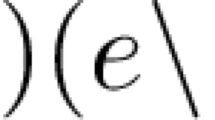Abstract
The Cantor–Bernstein–Schröder theorem (CBS-theorem for short) of set theory was generalized by Sikorski and Tarski to \(\sigma \)-complete Boolean algebras. After this, several generalizations of the CBS-theorem, extending the Sikorski–Tarski version to different classes of algebras, have been established. Among these classes there are lattice ordered groups, orthomodular lattices, MV-algebras, residuated lattices, etc. This suggests to consider a common algebraic framework in which the algebraic versions of the CBS-theorem can be formulated. In this work we provide this framework establishing necessary and sufficient conditions for the validity of the theorem. We also show how this abstract framework includes the versions of the CBS-theorem already present in the literature as well as new versions of the theorem extended to other classes such as groups, modules, semigroups, rings, \(*\)-rings etc.
Similar content being viewed by others
References
Balbes, R., Dwinger, Ph: Distributive Lattices. University of Missouri Press, Columbia (1974)
Berberian, S.K.: Baer Rings and Baer \(^*\)-Rings. University of Texas, Austin (2003). (preprint)
Berberian, S.K.: Baer \(^*\)-Rings. Springer, New York (2011)
Birkhoff, G.: Lattice Theory, 3rd edn. American Mathematical Society, Providence (1967)
Boicescu, V., Filipoiu, A., Georgescu, G., Rudeanu, S.: Łukasiewicz-Moisil Algebras. North-Holland, Amsterdam (1991)
Borel, E.: Leçons sur la Théorie des Fonctions. Gauthier-Villars et fils, Paris (1898)
Burris, S., Sankappanavar, H.P.: A Course in Universal Algebra. Springer, New York (1982)
Cignoli, R.: Representation of Łukasiewicz and Post algebras by continuous functions. Colloq. Math. 24, 128–138 (1972)
Cignoli, R., D’Ottaviano, I., Mundici, D.: Algebraic Foundations of Many-Valued Reasoning. Kluwer Academic Publishers, Dordrecht (2000)
Cignoli, R., Torrens, A.: An algebraic analysis of product logic. Mult. Valued Log. 5, 45–65 (2000)
Cintula, P.: About axiomatic systems of product fuzzy logic. Soft Comput. 5, 243–244 (2010)
De Simone, A., Mundici, D., Navara, M.: A Cantor–Bernstein theorem for \(\sigma \)-complete MV-algebras. Czechoslov. Math. J. 53, 437–447 (2003)
De Simone, A., Navara, M., Pták, P.: On interval homogeneous orthomodular lattices. Comment. Math. Univ. Carolin. 42, 23–30 (2001)
Di Nola, A., Navara, M.: MV-Algebras with the Cantor–Bernstein property. In: Castillo, O., Melin, P., Ross, O.M., Sepúlveda, Cruz R., Pedrycz, W., Kacprzyk, J. (eds.) Theoretical Advances and Applications of Fuzzy Logic and Soft Computing. Advances in Soft Computing, vol. 42, pp. 861–868. Springer, Berlin (2007)
Dvurečenskij, A.: Pseudo MV-algebras are intervals in l-groups. J. Austral. Math. Soc. 72, 427–445 (2002)
Dvurečenskij, A.: Central elements and Cantor–Bernstein s theorem for pseudo-effect algebras. J. Aust. Math. Soc. 74, 121–143 (2003)
Emanovský, P., Kühr, J.: Some properties of pseudo-BCK- and pseudo-BCI-algebras. Fuzzy Sets Syst. 339, 1–16 (2018)
Freytes, H.: An algebraic version of the Cantor–Bernstein–Schröder theorem. Czechoslov. Math. J. 54, 609–621 (2004)
Georgescu G., Iorgulescu A.: Pseudo-BCK algebras: an extension of BCK-algebra. In: Proceedings of the DMTCS’01, Combinatoric, Computability and Logic, pp. 97–114. London (2001)
Hájek, P.: Metamathematics of Fuzzy Logic. Kluwer Academic Publishers, Dordrecht (1998)
Iskander, A.: Factorable congruences and strict refinement. Acta Math. Univ. Comenianae 65, 101–109 (1996)
Jakubík, J.: Cantor-Bernstein theorem for MV-algebras. Czechoslov. Math. J. 49, 517–526 (1999)
Jakubík, J.: A theorem of Cantor-Bernstein type for orthogonal \(\sigma \)-complete pseudo MV-algebras. Tatra Mt. Math. Publ. 22, 91–103 (2001)
Jakubík, J.: On orthogonal \(\sigma \)-complete lattice ordered groups. Czechoslov. Math. J. 52, 881–888 (2002)
Jenča, G.: A Cantor Bernstein type theorem for effect algebras. Algebra Univ. 48, 399–411 (2002)
Jipsen, P., Tsinakis, C.: A survey of residuated lattices. In: Martinez, Jorge (ed.) Ordered Algebraic Structures, Developments in Mathematics, pp. 19–56. Springer, Boston (2002)
Kalman, J.: Lattices with involution. Trans. Am. Math. Soc. 87, 485–491 (1958)
Kaplansky, I.: Rings of Operators, 2nd edn. Benjamin, New York (1968)
Korselt, A.: Über einen Beweis des Äquivalenzsatzes. Math. Ann. 70, 294–296 (1911)
Kowalski T., Ono H.: Residuated lattices: an algebraic glimpse at logics without contraction. Preliminary report (2000)
Kühr, J.: Cantor Bernstein theorem for pseudo-BCK-algebras. Int. J. Theor. Phys. 47, 212–222 (2008)
Maeda, F., Maeda, S.: Theory of Symmetric Lattices. Springer, Berlin (1970)
Manzonetto G., Salibra A.: From \(\lambda \)-calculus to universal algebra and back. In: Proceedings of the 33rd International Symposium on Mathematical Foundations of Computer Science, LNCS, vol. 5162, pp. 479–490. Springer (2008)
Monk, J.: On pseudo-simple universal algebras. Proc. Am. Math. Soc. 13, 543–546 (1962)
Sikorski, R.: A generalization of theorems of Banach and Cantor–Bernstein. Colloq. Math. 1, 140–144 (1948)
Schröder, E., Über, G.: Cantor’sche Sätze. Jahresbericht der Deutschen Mathematiker-Vereinigung 5, 81–82 (1896)
Schröder, E.: Ueber zwei der Endlichkeit und G. Cantor’sche Sätze. Nova Acta Academiae Caesareae Leopoldino-Carolineae (Halle a. d. Saale) 71, 365–376 (1898)
Steinberg, S.: Lattice-Ordered Rings and Modules. Springer, New York (2010)
Swamy, U.M., Murti, G.S.: Boolean centre of a universal algebra. Algebra Univ. 13, 202–205 (1981)
Swamy, U.M., Murti, G.S.: Boolean centre of a semigroup. Pure Appl. Math. Sci. 13, 1–2 (1981)
Tarski, A.: Cardinal Algebras. Oxford University Press, New York (1949)
Author information
Authors and Affiliations
Corresponding author
Additional information
In memoriam: Roberto Cignoli (1937–2018).
Publisher's Note
Springer Nature remains neutral with regard to jurisdictional claims in published maps and institutional affiliations.
This research was partly supported by Horizon 2020 program of the European Commission: SYSMICS project, number: 689176, MSCA-RISE-2015 and Fondazione Banco di Sardegna project “Science and its Logics”, Cagliari, number: F72F16003220002”. The author expresses his gratitude to Giuseppe Sergioli for his careful reading of this work and to the anonymous referee for his extremely accurate comments.
Rights and permissions
About this article
Cite this article
Freytes, H. The Cantor–Bernstein–Schröder theorem via universal algebra. Algebra Univers. 80, 17 (2019). https://doi.org/10.1007/s00012-019-0590-8
Received:
Accepted:
Published:
DOI: https://doi.org/10.1007/s00012-019-0590-8



